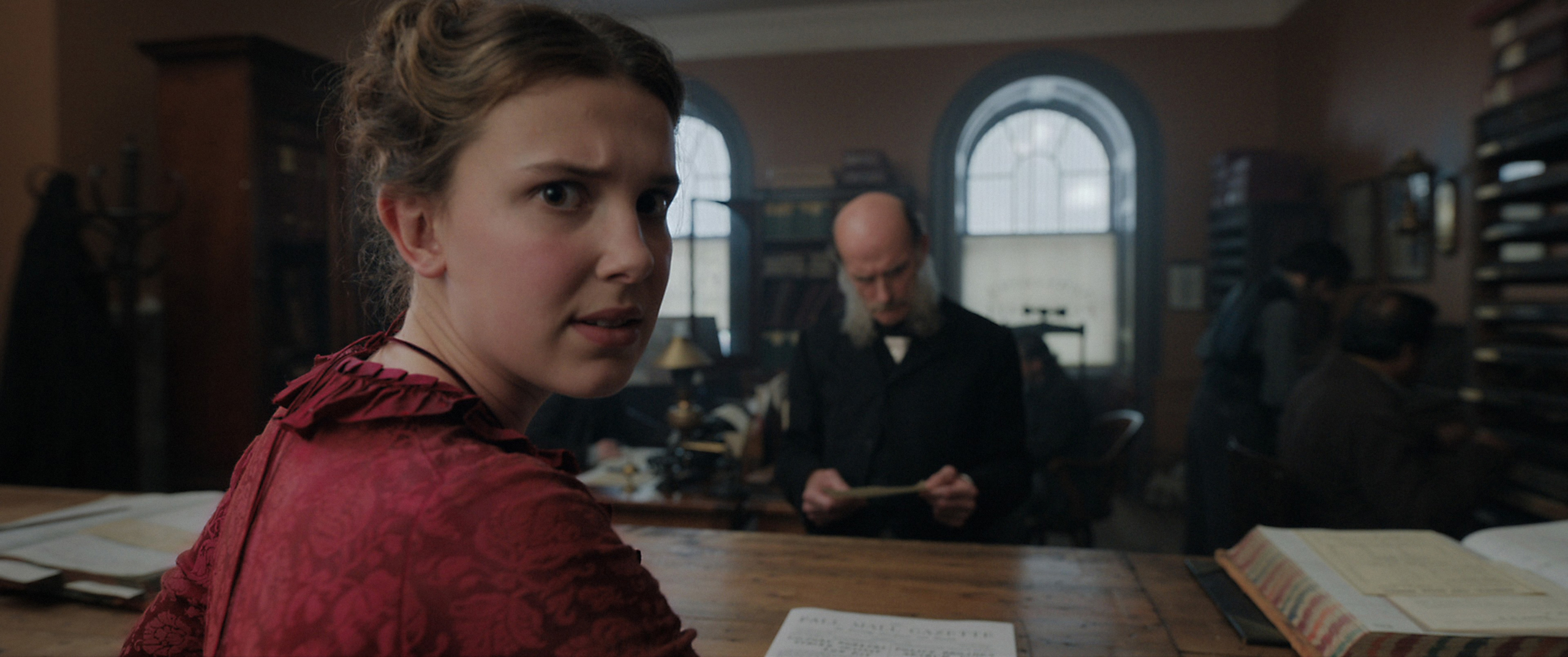Henry Cavill isn’t the first name that comes to mind when pondering the actors well-suited to portray Sherlock Holmes, but after watching him portray Sir Arthur Conan Doyle’s famous detective in Enola Holmes, that list might need to be revisited.
That’s not to suggest Cavill’s iteration of Holmes is the star of Netflix’s original film, which casts Stranger Things actress Millie Bobby Brown as the younger sister of Sherlock and Mycroft Holmes, with the latter portrayed by The Hunger Games actor Sam Claflin. Along with offering a fresh spin on the literary mythology of the Holmes siblings, Enola Holmes makes a strong case for Brown as the face of a new franchise set within that world.
Her story, not his
Directed by Harry Bradbeer (Fleabag, Killing Eve) from a script penned by Wonder screenwriter Jack Thorne, Enola Holmes is based on Nancy Springer’s series of novels that chronicle the mystery-solving adventures of the Holmes brothers’ teenage sister. The film follows Enola (Brown) as she investigates the mystery of her mother’s disappearance while simultaneously thwarting her brothers’ efforts to sequester her away in an austere finishing school for young women — a fate worse than death for the story’s free-spirited hero.

In the title role, Brown hits all the right notes as the clever, confident Enola, whose name — “Alone” spelled backwards — aligns well with her independent, self-assured perspective on the world. Brown shows a range of performance in Enola Holmes that her role in Netflix hit Stranger Things never quite offered (up to this point, at least), and finds an entertaining balance of cheeky humor and genuine pathos in her character that lets Enola shine brilliantly alongside one of the most iconic literary characters of the last two centuries.
Brown’s performance also strikes a comfortable synergy with Bradbeer’s vision for the character, which has Enola frequently engage in fourth-wall-breaking conversation with the audience.
These moments range from a subtle glance or sly wink directed at viewers to full-on engagement with the film’s audience, and will feel familiar to Fleabag fans who watched series star Phoebe Waller-Bridge establish a similar relationship with her audience through Bradbeer’s lens. Rather than simply using Enola’s fourth-wall awareness as a tool to deliver exposition, the relationship between Enola and her audience adds another layer of emotional depth to the character, making you privy to emotional feedback and unfiltered reactions that she hides from the characters around her.

The brothers Holmes
In supporting roles, Cavill and Claflin are both entertaining as the elder Holmes brothers, but it’s Cavill who really stands out as the master detective, Sherlock.
Best known for roles in which his characters’ emotional range has been limited by design — monster hunter Geralt in The Witcher, for example — Cavill doesn’t necessarily break from that trend with Sherlock Holmes, whose reserved demeanor is one of the figure’s trademark characteristics. And yet, Cavill does an impressive job of making those brief moments of emotion the story elicits from Sherlock matter. Cavill’s Sherlock feels more human than the iterations of the character portrayed by Robert Downey Jr. and Benedict Cumberbatch, which were both memorable in their own ways, but were often difficult to connect with on a human level.
Where other iterations of Sherlock Holmes limit your understanding of him to what you see through the lens of “normal” characters like his partner, John Watson, Enola Holmes opts to let you contextualize the character by the way he relates to Enola and the very human understanding of her that he develops. Although it’s not likely to please Sherlock purists, Cavill’s version of Sherlock feels like he could exist in the real world, rather than being a bundle of entertaining eccentricities and quirky habits.

A strong foundation
Along with its fresh spin on Sherlock and his wonderfully capable sister, Enola Holmes also delivers a well-crafted story that tells a stand-alone tale, while leaving the door open for future adventures.
Simply put, Enola Holmes is fun — a characteristic that isn’t typically associated with stories spun in the world of Sherlock Holmes — and never feels as if it’s taking itself or its cast of colorful characters too seriously. The film’s central mystery often feels secondary to the tale of Enola’s own journey of self-discovery and adventure, which maintains a brisk pace and a playful, enthusiastic sense of self-awareness from the opening scene until the closing credits.
If Netflix does see fit to explore more of Enola’s world, it would be a welcome addition to both the streaming service and the mythology of Doyle’s famous detective. Here’s hoping Enola Holmes makes the decision feel elementary to Netflix, and that we haven’t seen the last of the film’s endearing, mystery-solving heroine.

Directed by Harry Bradbeer and starring Millie Bobby Brown, Enola Holmes premieres September 23 on Netflix.



